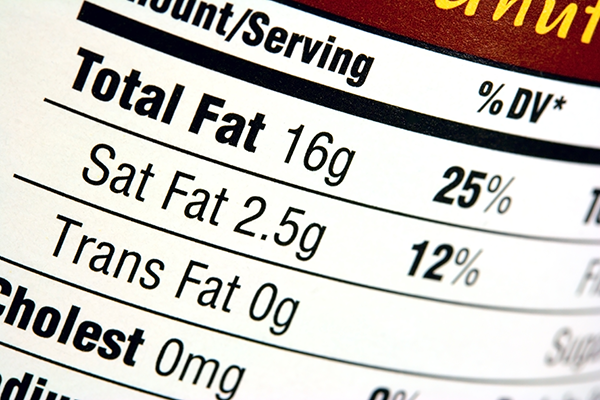[ad_1]
Consuming saturated fat and the effects it can have on your overall health — specifically heart disease — has become a controversial subject. It was once labeled the worst kind of fat, but trans fat has since inherited that role.
So what’s the deal with saturated fat? Here’s what we know:
- Replacing saturated fat with unsaturated fat may provide health benefits.
- Current research supports that saturated fats are better for us than trans fats.
In the world of dietary fat, saturated fat gets stuck in the middle. So how does it fit into a healthy diet?
What Is Saturated Fat?

With their single bonds and straight chains, saturated fat molecules can pack closely together, like bricks in a wall. This dense packing creates a strong internal structure, leading to a higher melting point and a solid state at room temperature.
“Saturated fats are saturated (filled) with hydrogen molecules and contain only single bonds between carbon molecules,” explains Lisa Young, Ph.D., RDN, a registered dietitian nutritionist and adjunct professor of nutrition at NYU. “Unsaturated fats contain at least one double bond between carbon molecules. Saturated fats are solid at room temperature, as opposed to unsaturated fats, like olive oil, which tend to be liquid at room temperature.”
Saturated fat is found mostly in animal foods, such as beef, lamb, and pork, but it’s also present in high-fat dairy products like butter and cheese and baked goods.
It’s back in the spotlight mostly because of the keto diet, in which people limit carb intake and boost their fat intake, hoping to train their bodies to burn fat as opposed to glucose (carbs) for fuel and speed weight loss.
But not all fats are the enemy that they were once thought to be. For example, olive oil and avocados are extremely good for you. Also, it’s important to note that dietary fat does not make you fat. And while your body doesn’t require saturated fat, it does require some fat for many reasons, such as vitamin absorption and other metabolic processes.
Your body needs the two essential fatty acids, which are the fats your body can’t produce on its own:
- Alpha-linolenic
- Linoleic acid
These fats are both found in unsaturated fats, also known as “healthy fats.”
Have Stances Changed on Saturated Fat?
For decades, it was believed that consuming saturated fat — again, picture that lovely visual of something that’s solid at room temperature — could clog the arteries, potentially causing heart disease, heart attacks, and strokes.
There is a lot of controversy among scientists and doctors/nutritionists about how bad saturated fat really is for you. However, that’s no license to go hog-wild.
“Whether or not saturated fat increases disease risk is currently controversial,” says Young. “With that said, a little bit is OK, but in my view, not more than the recommendation.”
She explains: “Dietary Guidelines for Americans, including the most recent report from the dietary advisory committee for the 2020–2025 guidelines, suggest aiming for a dietary pattern with no more than 10 percent of calories from saturated fat. The American Heart Association recommends even less.”
What that means:
- According to the Dietary Guidelines, if you consume a 2,000-calorie-a-day diet, only 200 calories should come from saturated fat. That’s about 20 grams.
- If you need to lower your cholesterol, the American Heart Association recommends reducing your saturated fat intake to five to six percent of your daily caloric intake. That’s no more than 100 to 120 calories from saturated fat (or 13 grams max).
Is Saturated Fat Actually Unhealthy?
According to Young, saturated fats are unhealthy, and it’s therefore suggested that they be limited. “Eating foods high in saturated fats (red meat, butter, cheese) raises cholesterol levels in your blood,” she says. “High levels of LDL cholesterol increase your risk of heart disease and stroke.”
Should I Include Saturated Fat In My Diet?

You’ve probably heard a lot about adding “healthy fats” to your diet. Saturated fat is not that.
“Healthy fats” are unsaturated fats. They’ve been associated with a number of benefits, including a reduction in heart disease risk. So skip the butter and cheese and eat fish, nuts, seeds, avocados, and olive oil instead.
Whatever you do, don’t replace saturated fat with processed foods or simple carbs. “Removing saturated fat and substituting refined carbs is not healthy,” says Young. “However, choosing unsaturated fats in place of saturated may (have the potential to) lead to improved health outcomes.”
The Bottom Line
Despite some controversial studies, research tends to lean towards limiting dietary intake of saturated fat. This is because saturated fat may have the ability to potentially raise cholesterol levels.
You can enjoy saturated fat in moderation. As stated above, up to 10% of your total calories can come from saturated fat, but eat less if you have risk factors for heart disease. And keep in mind that your body doesn’t need saturated fat, meaning you don’t have to add it to your diet.
Click here to get The Oxridized Cholesterol Strategy at discounted price while it’s still available…
[ad_2]



5 Comments
Tham gia cộng đồng game thủ tại Go88 để trải nghiệm các trò chơi bài, poker phổ biến nhất hiện nay.
Đến với J88, bạn sẽ được trải nghiệm dịch vụ cá cược chuyên nghiệp cùng hàng ngàn sự kiện khuyến mãi độc quyền.
Khám phá thế giới giải trí trực tuyến đỉnh cao tại MM88, nơi mang đến những trải nghiệm cá cược thể thao và casino sống động.
Với giao diện mượt mà và ưu đãi hấp dẫn, MM88 là lựa chọn lý tưởng cho các tín đồ giải trí trực tuyến.
chanced casino chanced casino